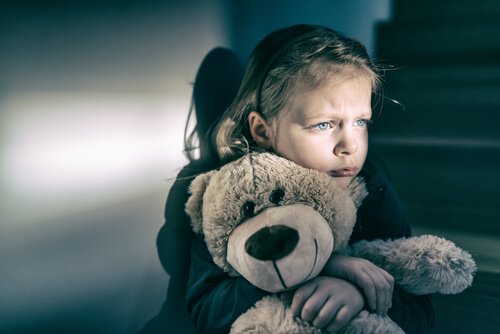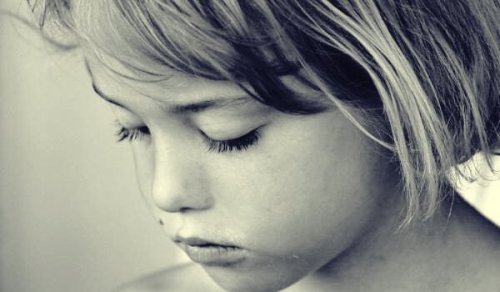How Parents Affect Their Children's Mental Health


Written and verified by the psychologist Valeria Sabater
Sometimes, family environments can cause more than suffering. In this sense, parents can affect their children’s mental health. Some parents put their children in stressful situations where they might feel humiliated, anxious, or helpless. These kinds of experiences are difficult and carry over into our adult lives.
Oscar Wilde said that almost no one is aware of what happens inside closed doors. Sometimes, a house with closed doors and windows is the perfect setting for very scary things. Mothers, fathers, or other family members can shape invisible drama that goes unnoticed by the rest of society.
What’s more, this affects children in significant ways. Dr. Anne-Marie Conn from the University of Rochester Medical Center studied this phenomenon. She found that the impact of a dysfunctional upbringing and the resulting psychological damage can be passed on to the next generation.
In other words, trauma due to lack of attachment, abuse, physical or psychological violence, or anything else that affects a child’s optimal psycho-emotional development can have a ripple effect. Trauma affects mental health and can change brain development. This can lead to psychological disorders which can later affect how these people raise their own children.
“Mental health needs a great deal of attention. It’s the final taboo and it needs to be faced and dealt with.”
-Adam Ant-

When parents affect their children’s mental health
Parents can affect their children’s mental health. A secure family environment that fosters a positive emotional development and good self-esteem has lasting repercussions. This type of upbringing gives children the opportunity to reach adulthood with exceptional psychological abilities. On the other hand, a tumultuous or traumatic upbringing can seriously affect a child’s psychological well-being.
What’s more, we now know that the main cause of emotional and behavioral problems in children is their family dynamic and environment. In fact, the Journal of Family Psychology published a study not too long ago which argued that a simple spank on the bottom can have negative consequences.
Any gesture, word, or behavior that’s implicitly or explicitly aggressive will leave its mark. It will change the child’s behavior and even leave an impression on the child’s brain. So, when kids grow up in these kinds of surroundings or with certain harmful parenting strategies (spanking, aggressive communication, or authoritarian caregivers) they tend to display certain behaviors and characteristics:
- Low self-esteem.
- They assume that their own needs aren’t important.
- They believe that expressing emotions is negative and wrong.
- Also, they accept that these family dynamics (aggressiveness, abuse, or disrespect) are normal and even permissible.

Growing up in this type of context means that every experience scars you in a particular way. Yes, it’s true that some people manage to overcome a difficult childhood and live healthy, anxiety-free lives. However, most people are more vulnerable and these experiences significantly affect their mental health. Let’s dig a little deeper into this.
How do parents affect their children’s mental health?
One of the most common ways that a traumatic childhood manifests itself in adults is through chronic stress.
States of permanent stress
When a child lives in an unstable environment, they’ll experience stress. Growing up without an attachment to a primary caregiver and feeling insecure and unloved leads to significant anxiety. This kind of stress is initially acute. However, over a prolonged period of time, it can become permanent.
Chronic stress can even alter brain functionality. It can affect attention span and memory. It often translates into hyperactivity and poor emotional management.
Co-dependent relationships
Growing up in a cold and unaffectionate household makes many people anxious for strong emotional relationships. They want to feel validated and safe. However, the constant fear of losing this kind of bond can lead to obsessive behavior. They’re so afraid that they can easily fall into co-dependent relationships.
Parents affect their children’s mental health in many different ways. We should all understand that the way children are raised has a serious impact on their lives and on the adults they’ll become. Everyone should pay attention to this and model better alternatives through positive behavior and language.
Permanent anxiety and helplessness
Growing up without the safety and security of a caring family has consequences. If you lack an enriching environment that helps you develop your own identity, you might grow up with serious psychological deficiencies. You can end up being hopeless and having a low self-esteem. In this context, you’re more likely to be chronically pessimistic and anxious.
Learned helplessness is also a common psychological reality. This is when someone assumes that they can’t change things no matter what they do. They assume they have no control over their own life.
Psychological mechanisms to “hide” a traumatic past
The mind often can’t deal with the weight of trauma, so it uses certain psychological mechanisms to be able to manage the day-to-day without letting trauma affect it. This helps people function for a certain time. However, this leads them to develop psychological disorders.
In this regard, the most common ones are dissociative disorders which affect identity, memory, and the perception of your surroundings. It’s a pretty common side-effect of post-traumatic stress. Dissociative disorder is rooted in trauma.

In conclusion, parents can affect their children’s mental health in many ways. Getting out of these black holes requires more than time. You need plenty of courage and plenty of assistance. Seeking professional and specialized help will help you get control of your life. Even with a traumatic past, you can make a healthy, dignified, and satisfied life for yourself.
This text is provided for informational purposes only and does not replace consultation with a professional. If in doubt, consult your specialist.








